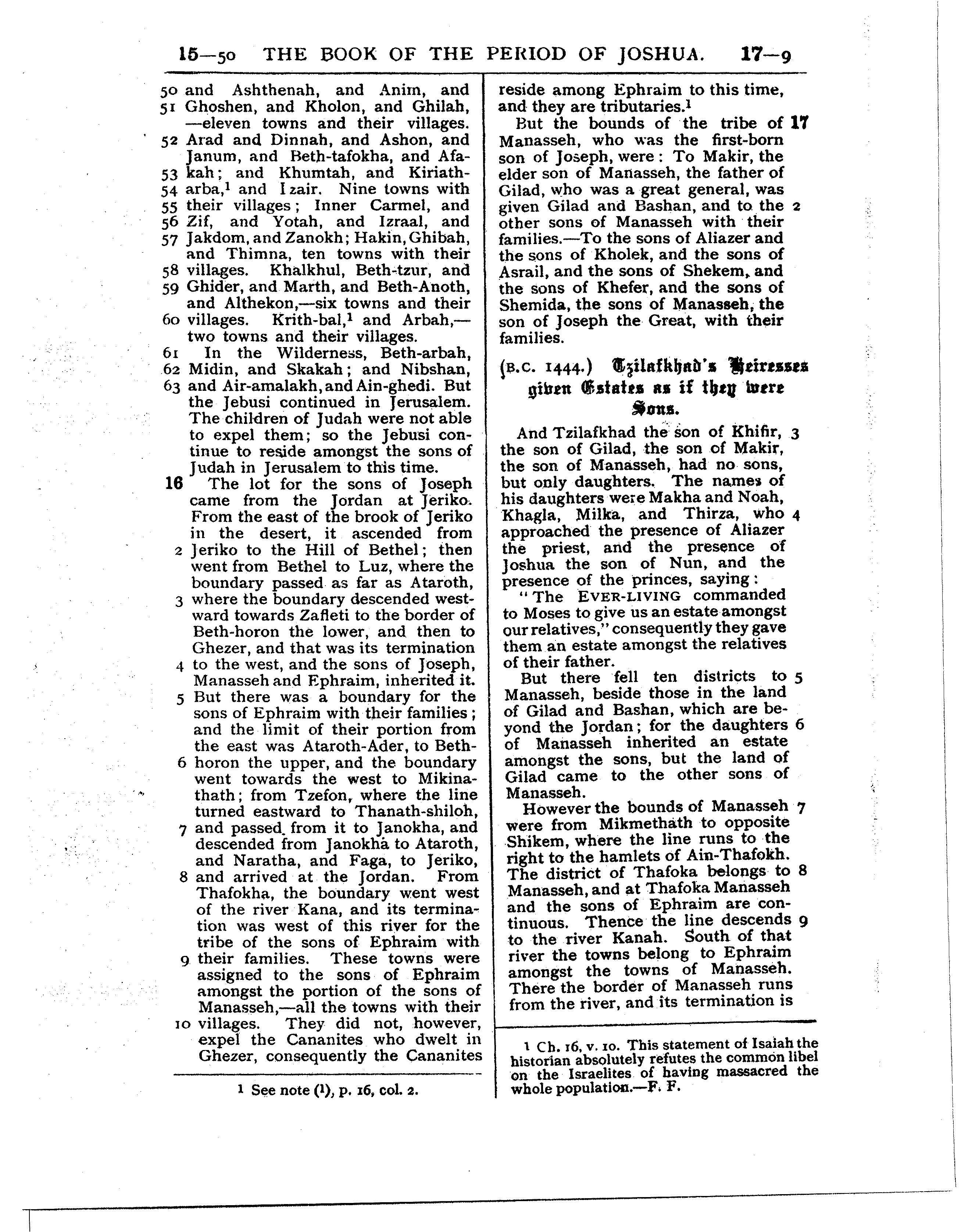Joshua - Ferrar Fenton Bible Translation page 239
The History of the People of Israel
Amd and Dirmah, and Ashon, and janum, and Beth~taf0kha, and Afa~ kah; and Khumtah, and Kiria.th· arba,1 and Izair. Nine towns with their villages; Inner Carmel, and Zif, and Yotah, and Izraal, and jakdom, and Zanokh; I—Iakin,Ghibah, and Thimna, ten towns with their villages. Khalkhul, Beth+tzur, and Ghider, and Marth, and Beth-Anoth, But the bounds of the tribe of
Manasseh, who was the first~b0m son of joseph, were: To Makir, the elder son of Manasseh, the father of Giiad, who was a great general, was given Gilad and Bashan, and tothe other sons of Manasseh with their families.-—-'I`o the sons of Aliazer and the sons of Kholek, and the sons of Asrail, and the sons of Shekem, and and Althekon,-··six towns and their 60 villages. Krith-bal,1 and Arbah, two towns and their villages. 61 In the Wilderness, Beth·arbah, 62 Midin, and Skakah; and Nibshan, 63 and Air·amalakh,and Aimghedi. But the jebusi continued in Ierusaletn. The children of judah were not able to expel them; so the jebusi con· timie to reside amongst the sons of judah in jerusalem to this time. 16 The lot for the sons of joseph
came from the Lordan at jerikoi. From the east of t e brook of jeriko in the desert, it ascended from jeeriko to the Hill of Bethel; then went from Bethel to Luz, where the boundary passed. as far as Ataroth, where the boundary descended west· ward towards Zafleti to the border of Beth~horon the lower, and then to Ghezer, and that was its termination to the west, and the sons of }oseph, IO Manasseh and Ephraim, inherited it. But there was a boundary for the sons of Ephraim with their families ; and the limit of their portion from the east was Ataroth—Ader, to Beth- horon the upper, and the boundary went towards the west to Mikina· thath; from Tzefon, where the line turned eastward to Thanath—shi1oh, and passed from it to janokha, and descended from janokha to Ataroth, and Naratha, and Faga, to jeriko, and arrived at the jordan. From T hafokha, the boundary went west of the river Kana, and its termina— tion was west of this river for the tribe of the sons of Ephraim with their families. These towns were assigned to the sons of Ephraim amongst the portion of the sons of Manasseh,—-all the towns with their villages. They did not, however, expel the Cananites who dwelt in Ghezer, consequently the Cananites 1 See note (1), p. 16, col. 2. the sons of Khefer, and the sons of Shemida, the sons of Manasseh, the son of joseph the- Great, with their families. 17
B·C· I444-) @§i¥¤fkh¤¤'s Zzirzsszs gitmt Qistatu me if they here Sums. And Tzilafkhad the son of Khilir, 3 the son of Gilacl, the son of Makit, the son of Manasseh, had no sons, but only daughters. The names of his daughterswere Makha and Noah, Khagla, Milka, and '1`hirza, who 4 approached the presence of Aliazer the priest, and the presence of joshua the son of Nun, and the presence of the princes, saying: l`he EVER-LIVING commanded
to Moses to give us an estateamongst our relatives? consequently they gave them an estate amongst the relatives of their father. But there `fell ten districts to 5 Manasseh, beside those in the land of Gilad and Bashan, which are be· youd the jordan; for the daughters 6 of Manasseh inherited an estate amongst the sons, but the land of Gilad came to the other sons of Manasseh. However the bounds of Manasseh 7 were from Mikmethath to opposite Shikem, where the line runs to the right to the hamlets of Ain—Thafolth. The district of Thafoka belongs to 8 Manasseh, and at Thafoka Manasseh and the sons of Ephraim are con- tinuous. Thence the line descends 9 to the iriver Kanah. South of that river the towns belong to Ephraim amongst the towns of Manasseh. There the border of Manasseh runs from the river, and its termination is T C h. x6. v. 10. This statement of Isaiah the
historian absolutely refutes the common libel on the Israelites. of having massacred the whole population.--Fr F.
